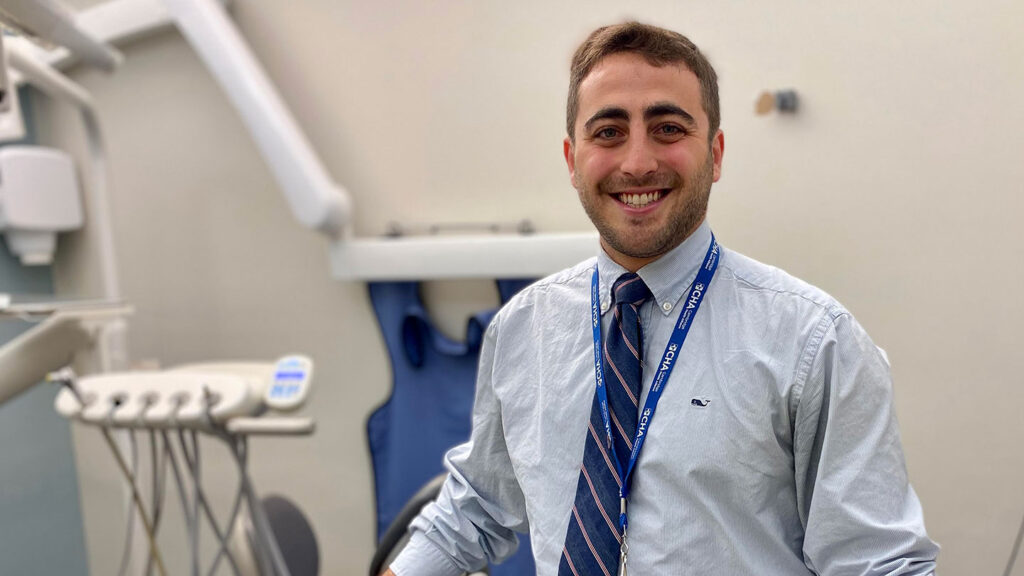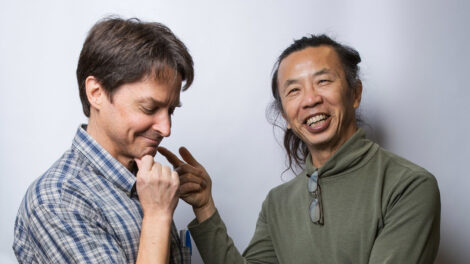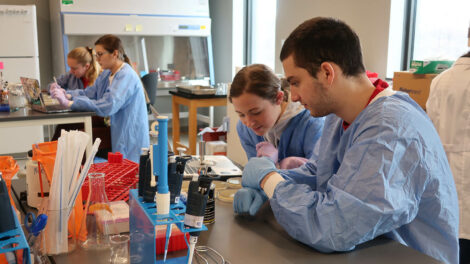Biochemistry grad talks about his Lafayette experience and his role in helping to shape the future of oral health
Alec Eidelman ’13 is the inaugural oral health teaching fellow at Cambridge Health Alliance. His responsibilities include teaching and researching how oral health and medicine may be integrated in education and practice to students at Harvard medical and dental schools. Dr. Eidelman earned his doctoral degree in dental medicine (D.M.D.) and his master’s in public health (M.P.H.) from Tufts University. Through the fellowship, he is also pursuing a Master of Education by distance learning with University of Dundee in Scotland. Additionally, he holds a Bachelor of Science degree in biochemistry from Lafayette College.

Alec Eidelman ’13 is the inaugural oral health teaching fellow at Cambridge Health Alliance.
What do you love about the work you do? What does it mean to you to be able to improve the lives of others?
Every day, I find meaning in knowing that I have the privilege to help individuals and populations to access care and resources that they may otherwise not be provided. Medicine and dentistry have been separated by insurance, physical location, and culture for centuries. The United States health systems have recognized that dramatic reforms are needed to achieve levels of clinical and financial sustainability. I feel motivated and supported to help lead the change that has been called for in my field to begin implementing change in a concerted and organized fashion. It is challenging and daunting work, and I use a community-oriented focus on building a robust and diverse coalition of stakeholders to help bring these visions to reality.
What sparked your interest in dentistry and research? Was this something you always wanted to do?
I always wanted to work with my hands, work in health sciences, and—most importantly—work with people. During college, I explored medical and dental externships through Lafayette’s Gateway Career Center, and I also held summer internships in biotechnology. My primary focus during college was to make the most of my experience and savor every opportunity available to students from the robust resources available. I did not know I wanted to be a dentist until I was in my second year of dental school, when I fully realized I could forge my own career path. I never would have guessed that my academic journey that began at Lafayette would lead me to where I am today, and I doubt it would have been possible without many of the experiences I had there.
How did your experiences at Lafayette help lay the foundation for your career and build the necessary skills that you use in your work today?
While there are many instances during my practice of dentistry that might lend itself to recalling my lessons in Physical Chemistry II or complex ethical considerations from my Bioethics course in Kirby Hall of Civil Rights, there are fundamental skills and attitudes from my Lafayette experience that cornerstone my career. Critical thinking, initiative, and teamwork are skills that were shaped at Lafayette primarily from the student-driven ethos on campus. No matter what sector or industry graduates find themselves in, these skills will always be valuable and what are cultivated through the boundless student-run initiatives on campus.
Were there any research projects you engaged in during your time at Lafayette that have particularly impacted you throughout the course of your career?
My experience as an EXCEL Scholar with Robert Kurt [Kreider Professor of biology]. I am tremendously grateful for Dr. Kurt’s gracious support throughout three years of undergraduate research at Lafayette College, and for the mentorship I received from Dr. Kurt and so many other advisers at Lafayette that I feel so fortunate to be able to reciprocate now. These formative experiences provided a robust and safe learning environment through self-driven exploration.
What kind of advice can you offer to current biology students about how to apply what they’re learning to their future careers?
The best advice I’ve received from a mentor is what I pass along to those seeking advice: The positions and roles you are working toward may not be established yet. Despite it being uncertain about working toward a goal you cannot see, try to build a support network invested in you to help you reach these visions. I encourage students to take as much time as they need to realize their vision, and not rush into graduate school decisions. The valuable life experiences I learned working prior to embarking on graduate school helped direct where I am today in such a meaningful way that I may not have been exposed to had I not taken this time after Lafayette.


